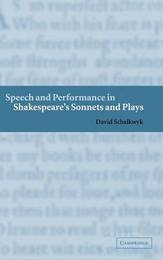
|
Speech and Performance in Shakespeare's Sonnets and Plays
Hardback
Main Details
| Title |
Speech and Performance in Shakespeare's Sonnets and Plays
|
| Authors and Contributors |
By (author) David Schalkwyk
|
| Physical Properties |
| Format:Hardback | | Pages:274 | | Dimensions(mm): Height 229,Width 152 |
|
| Category/Genre | Acting techniques
Literary studies - general |
|---|
| ISBN/Barcode |
9780521811156
|
| Classifications | Dewey:822.33 |
|---|
| Audience | | Professional & Vocational | |
|---|
|
Publishing Details |
| Publisher |
Cambridge University Press
|
| Imprint |
Cambridge University Press
|
| Publication Date |
17 October 2002 |
| Publication Country |
United Kingdom
|
Description
David Schalkwyk offers a sustained reading of Shakespeare's sonnets in relation to his plays. He argues that the language of the sonnets is primarily performative rather than descriptive, and bases this distinction on the philosophy of Ludwig Wittgenstein and J. L. Austin. In a wide-ranging analysis of both the 1609 quarto of Shakespeare's sonnets and the Petrarchan discourses in a selection of plays, Schalkwyk addresses such issues as embodiment and silencing, interiority and theatricality, inequalities of power, status, gender and desire, both in the published poems and on the stage and in the context of the early modern period. In a provocative discussion of the question of proper names and naming events in the sonnets and plays, the book seeks to reopen the question of the autobiographical nature of Shakespeare's sonnets.
Author Biography
David Schalkwyk is Associate Professor and Head of the Department of English Language and Literature at the University of Cape Town. He has published on Shakespeare, literary theory, philosophy, and South African literature in the Shakespeare Quarterly, English Literary Renaissance, the Journal of Aesthetics and Art Criticism, Pretexts, Linguistic Sciences, Textus, and the Journal of Literary Studies.
Reviews'Schalkwyk's Speech and Performance in Shakespeare's Sonnets and Plays is a profound and challenging book ... The book will be of interest not only to Shakespeare scholars, but to anyone concerned with the intricate negotiations of self through language.' English Academy Review
|